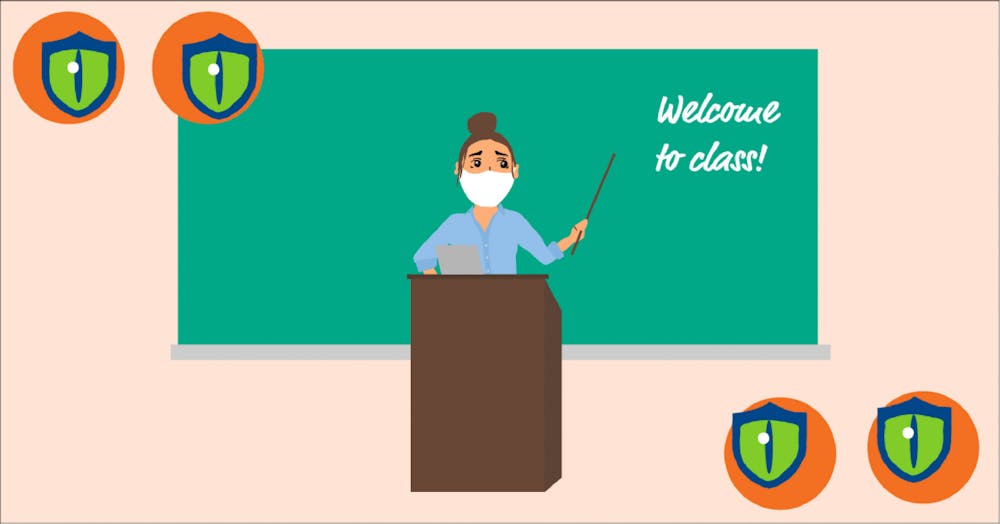UF’s commitment to in-person classes this Spring has led to threats of disciplinary action, giving students the ability to report faculty who don’t follow through with face-to-face interactions.
Some professors are frustrated by the update to the GatorSAFE app that allows students to anonymously report instructors who attempt to deliver in-person courses online. The UF faculty union is calling it a breach of contract.
“These are just divisive measures that are going to create distrust between faculty and students and will have lasting effects if UF doesn't wake up,” said Paul Ortiz, the chair of UF’s faculty union United Faculty of Florida-UF.
The GatorSAFE app allows students to report “inconsistencies with course delivery for your face-to-face or online courses, such as not being provided the opportunity to meet in person for your face-to-face class.”
Ortiz said the submissions could potentially violate Article 18 of their collective bargaining agreement, the contract negotiated between UF and the union.
Article 18 offers only two components to be used for a faculty evaluation: an annual report completed by a department chair that summarizes the faculty member’s performance and activities, and GatorEvals, the anonymous evaluations students submit at the end of a semester.
“In the case of that portal, it’s a violation of our due process because it allows someone to make an anonymous complaint,” Ortiz said. “It’s almost like a crime line.”
UF spokeswoman Hessy Fernandez wrote in an email that interference with an in-person section undermines a student’s class choice.
“Students have been asked to inform the university when the course delivery does not meet expectations of what they registered for,” Fernandez wrote. “The GatorSAFE app simply makes it easier for students to do so.”
Should a faculty member be reported, their dean would receive the report and determine their punishment, Fernandez wrote.
Guidance in one of UF’s 13 colleges has mirrored the university’s hardline stance on enforcing face-to-face instruction.
In an email to faculty and staff discussing in-person courses, UF College of Liberal Arts and Sciences dean David Richardson instructed faculty not to interfere with a student’s preferred modality.
“Instructors cannot advise or encourage students in face-to-face sections to switch to the online section or vice-versa,” Richardson wrote. “Actions that contravene these principles may result in a finding of misconduct and disciplinary action by the university in accordance with UF regulations.”
Ortiz said the dean’s policy was a violation of Article 10 of the contract, which states that faculty “shall be free to discuss all relevant matters in the classroom” and can “speak freely on all matters of university governance.”
He said he’s advised UF students not in his classes debating between the two and found the university’s policy to illegally impose on that.
“The flip side of that is that they're encouraging me not to say anything but then you're encouraging students to make an anonymous complaint,” Ortiz said.
William Connellan, a UF assistant provost and UF’s chief bargainer with the union, said the policies were not violations and that no one has filed a grievance with the university. Ortiz said grievances are under consideration, though he hopes UF reverses its policies first.
If a grievance is filed, a hearing will be held with the dean who oversees the violation and both parties will work toward a solution, according to UFF-UF’s website. If they don’t agree on a solution, a review process will begin with the provost’s office, which then offers an official decision.
If no solution is found at either the hearing or review stage, the grievance would move to arbitration — settlement discussions handled by a third party.
UFF-UF and UF would then bring their case to a mutually agreed-upon arbitrator in a hearing, with both sides presenting documents and witness testimonies and, eventually, a final brief. The arbitrator would then make a final, legally binding decision on whether the policy should be reversed — which cannot be appealed.
In a follow-up Q&A sent to faculty members Wednesday, CLAS Dean Richardson laid out the guidelines for how they must hold in-person classes. That includes allowing students to transition between in-person and online — with instructor approval — and requiring professors to teach in classrooms even if all students moved online, though he hopes UF will relax that.
When asked about what consequences faculty members may face if they encourage students to switch class sections, Richardson wrote in an email that students should be given the options they registered for but did not state any disciplinary actions.
“The Spring semester course schedule was constructed to give undergraduate students as much flexibility as possible in choosing the teaching modality that is right for their individual educational goals,” he wrote. “We believe that students must have the freedom to remain in the class section they registered to attend.”
To Ortiz, UF’s measures are just creating further division.
“Nationally, it’s going to have an impact because people will see it as a possible bellwether,” Ortiz said. “If UF can get away with this, what’s next?”
Contact Corbin Bolies at cbolies@alligator.org. Follow him on Twitter @CorbinBolies.






